「だから、私、女の子だって..」
= Dakara watashi onnanoko datte…
= I told you. I am a girl!
Hi everyone!
ゴールデンウイーク = Gooruden uiiku = Golden Week has just started in Japan so I will teach you about Japanese holidays in spring.
First,
Holidays in Japanese is 祝日 ( = shukujitu) or 国民の祝日 ( = Kokumin no shukujitsu ) = National Holidays.
The literal meaning of 祝日 ( = shukujitsu) is
![]() 祝 = いわう/しゅく =iwau / shuku = to celebrate
祝 = いわう/しゅく =iwau / shuku = to celebrate
![]() 日 = ひ/び/にち/か = hi/bi/nichi/ka = day
日 = ひ/び/にち/か = hi/bi/nichi/ka = day
People from older generations call it 旗日 ( = hatabi ) = flag holiday because we fly the Japanese flag in front of office buildings or houses on National Holidays. But we rarely see the flag flying in front of regular houses on national holidays these days.
We also refer to holidays, days offs, and vacation (お)休み (=(o)yasumi)
:: Note : adding お ( = o) in front of word makes it sound more polite or formal. (It doesn’t work with all words, though.)
Ex. 明日は休みです。
= Ashita wa yasumi desu.
= It’s my day off tomorrow.
If you want to take a day off you ask your boss
Ex. すみませんが、来週、お休みを頂けますか?
= Sumimasen ga raishuu oyasumi wo itadakemasu ka?
= Can I have a day off next week?
Vacation is called 休暇 ( = kyuuka)
Ex. 休暇を利用して旅行に行きたい。
= Kyuka wo riyou shite ryokou ni ikitai.
= I would like to use my vacation time to go traveling.
A long vacation is called 長期休暇 ( = chouki kyuuka)
Ex. 長期休暇をとる
= Chouki kyuka wo toru
= to take a long vacation
Unless you are a student who can take a long vacation such as:
•春休み ( = haruyasumi ) spring vacation, spring break
•夏休み ( = natsuyasumi ) summer vacation
•冬休み ( = fuyuyasumi ) winter vacation
you can’t take many days off if you work for a Japanese company.
★正月休み ( = shougatsu yasumi) New Year’s holidays
![]() Dec. 31, Jan. 1, 2, 3 + or more (depending on the company)
Dec. 31, Jan. 1, 2, 3 + or more (depending on the company)
★(お)盆休み (= (O)bon yasumi ) Bon holidays
![]() August 13,14, 15or more (depending on the company)
August 13,14, 15or more (depending on the company)
And we are now in
★ゴールデンウイーク ( = gooruden uiiku ) Golden Week
![]() For short we also call it GW. GW lasts from the end of April until the beginning of May
For short we also call it GW. GW lasts from the end of April until the beginning of May
The Japanese name is 黄金週間 ( = ougon shuukan)
( 黄金 ( = ougon ) gold(en) + 週間 ( = shuukan) week(s)
but ゴールデンウイーク ( = gooruden uiiku ) Golden Week is more common and we also write it as G.W. or GW
Ex. GW中はどこも混雑します。
= Gooruden uiiku chuu wa dokomo konzatsu shimasu.
= It’s crowded everywhere during the Golden Week.
Ex. GW 明けに会おうか?
= Gooruden uiiku ake ni aou ka?
= Let’s get together after Golden Week!
• April 29th :昭和の日 ( = Showa no hi)
It is used to be The Emperor’s Birthday = 天皇誕生日 ( = Tennou Tanjoubi) but from 1989 we changed the name of this national holiday to みどりの日 ( = Midori no hi) = Greenery Day and it was then changed to 昭和の日 ( = Shouwa no hi) in 2007
• May 3rd : 憲法記念日 ( = Kenpou Kinenbi ) Constitution Memorial Day
• May 4th : みどりの日 ( = Midori no hi ) Greenery Day
• May 5th : こどもの日 ( = Kodomono hi ) Children’s Day
*It is customary called “端午の節句” = Tango no sekku
Compared to other countries, Japan doesn’t have so many holidays.
So we have to appreciate these little holidays.
For example if you have a holiday on Monday or Saturday, it is called
![]() 連休 ( = renkyuu ) consecutive holidays
連休 ( = renkyuu ) consecutive holidays
Ex. 連休はどこも混んでいるから家にいます。
= Renkuu wa dokomo konde irukara ie ni imasu.
= I will stay home because it is going to be crowded everywhere during the Golden Week.
Ex.「この連休どっか行く?」(casual)
= Kono renkyuu dokka iku?
= Are you going somewhere over the long holiday?
「ううん、どっこも行かない。」(casual)
= Uun dokkomo ikanai.
= No, I won’t go anywhere.
Note : どっか ( = dokka) is a casual way to say どこかへ ( = dokokaye) or どこかに ( = dokokani ) = somewhere
どっこも ( = dokkomo) is also a casual way to say どこにも ( = dokonimo) = anywhere
If you have a three day weekend, you call it
![]() 3連休 ( = san renkyuu) three consecutive day holidays, three day weekend
3連休 ( = san renkyuu) three consecutive day holidays, three day weekend
If you have a few holidays but there is an interval between the holidays, we call it
![]() 飛び石連休 ( = tobiishi renkyuu ) series of holidays with an interval in between
飛び石連休 ( = tobiishi renkyuu ) series of holidays with an interval in between
Note : 飛び石 ( = tobiishi) means “stepping stones”
Long holidays are called:
→大型連休 ( = oogata renkyuu) = long holidays
************************************************************************
Now, let’s talk about May 5th, also known as こどもの日 ( = Kodomono hi )=Children’s Day.
We celebrate the well-being of children today but it is customarily called “端午の節句” ( = Tango no sekku) and it was originally for boys.
:s: Note : 端午 ( = tango)
• 端 ( = hashi/tan) means ”the edge” / “the end”
• 午 ( = go) means “noon” and it refers to “May“.
So 端午 ( = tango) means “the end of the season” which means the beginning of the new season.
節句 = sekku means special and important days to have traditional events.
(We have a Girls Day on March 3rd and it is called 雛祭り ( = Hinamatsuri) Doll’s festival or
桃の節句 ( = momo no sekku) →桃 ( = momo) peaches )
OK, let’s take a look at the picture above.
:maggie-small: 「だから、私、女の子だって(言ってるでしょ!)」
= Dakara watashi onnanoko datte (itterudesho) !).
= I told you, I am a girl!
:s: Note : だから ( = dakara) usually mean “That’s why” “therefore” or “so” and used when you explain some reason.
Ex. 昨日は体調がよくなく一日寝ていました。だからクラスへ行けなかったのです。
= KInou wa taichou ga yokunaku ichinichi nete imashita. Dakara kurasu ye ikenakatta nodesu.
= I was under the weather all day yesterday. That is why I couldn’t go to class.
Ex. 昨日、給料が出たんだ。だからおごってあげるよ!
= Kinou kyuuryou ga detanda. Dakara ogotte ageru yo!
= I got paid yesterday. So I’ll treat you.
But we also use it when we want to add stress to a sentence.
For example if the listener made mistake disregarding your warning,
you would say,
![]() (That’s why) I told you!
(That’s why) I told you!
Ex. だから言ったでしょ!(female speech)
= Dakara itta desho!
Ex. だから言ったじゃない!(female speech /more casual)
= Dakara itta janai!
Ex. だから言っただろ!(Male speech, rough)
= Dakara itta daro!
Also we use it when we repeat something, rephrase what we meant, or bring up some obvious fact that the listener doesn’t get.
Ex. だから、私は行きたくないの!
= Dakara watashi wa ikitaku naino!
= I told you, I don’t want to go!
Ex. だから俺はお前のことが好きなんだよ!(male speech )
= Dakara ore wa omae no koto ga sukinandayo!
= I told you (or Isn’t it obvious?/ You should know) I like you!
What Maggie Sensei is wearing is called 兜 = かぶと= kabuto= traditional Samurai helmet
We still decorate 兜 = かぶと ( = kabuto) traditional Samurai helmet,
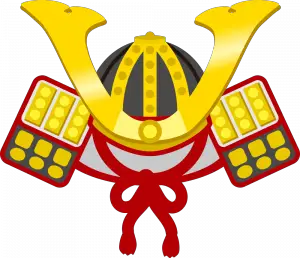
or 五月人形 ( = gogatsu ningyou) the literal meaning is May Dolls, they are traditional military commander dolls.
:u: (It looks a bit scary for me..)
or raise 鯉のぼり ( = koinobori )= carp shaped flags outside of your house if you have a boy in your family.
(Usually only when their boys are little.) because 鯉のぼり ( = koinobori) = carp-shaped streamers represent success and strength.
真鯉 ( = magoi) = black carp、緋鯉 ( = higoi) red carp、子鯉 ( = kogoi) = child carp (The color and number varies.)
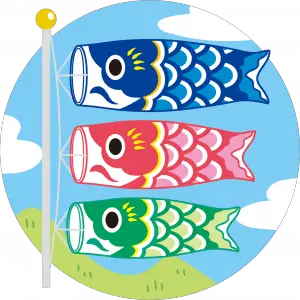
:u: Sometimes they hung them horizontally along the river.
吹き流し = fukinabashi = flying streamers (The left one)
:r: !onpu! Here’s a tradition children’s song : 鯉のぼり ( = koinobori)
* 屋根より高い鯉のぼり
= Yane yori takai koinobori
= Carp streamers are higher than the roof
:ii: Note : comparative sentence :
B は ( = wa) Aより ( = yori) + adjectve
![]() A より ( = yori) + adjective +B
A より ( = yori) + adjective +B
![]() B is more (adjective ) than A
B is more (adjective ) than A
Ex. B はA より高い
= B wa A yori takai
= B is higher than A
![]() A より高いB
A より高いB
= A yori takai B
= B which is higher than A = B is higher than A
* 大きい真鯉はお父さん
= Ookii magoi wa otoosan
= The big black carp is the father
* 小さい緋鯉は子供達
= Chiisai higoi wa kodomotachi
= The small red (scarlet) carps are the children
* 面白そうに泳いでる。
= Omoshirosou ni oyoideru
= They seem having fun swimming.
Note : ~そうに ( = souni) + verb = Looks ~ doing something, having appearance of, seeming ~
Ex. 美味しそうに食べている
= Oishisou ni tabeteiru.
= Eating something with gusto.
(From Maggie :maggie-small: : You know what? I just realized one thing. This song doesn’t refer to a mother carp. And I thought mother carp were the red ones and the child carps were blue or other colors… megamaru-O )
And we eat 柏もち ( = kashiwa mochi) sweetened rice cake wrapped with 柏 ( = kashiwa) oak leaf
Can you read the kanji 端午の節句 ( = Tango no Sekku)? on the package below?
As you can see in the picture 菖蒲 ( = shoubu) or アヤメ ( = ayame ) Iris flowers are symbols of May.
Traditionally we bathe children in a bath with iris leaves hoping that they grow healthy.
They stuff 餡 = an= sweet beans paste inside of かしわ餅 ( = kashiwa mochi).

or ちまき ( = chimaki )= sweetened ricecake wrapped with 笹 ( = sasa) bamboo leaf
 マギー先生より = Maggie Sensei yori = From Maggie Sensei
マギー先生より = Maggie Sensei yori = From Maggie Sensei
今年のGWはどこへ行こうかな。
= Kotoshi no GW wa doko ye ikou kana.
= I wonder where I should go during the GW this year.
***
Will you be my Patron?
I appreciate your support! サポートありがとう!

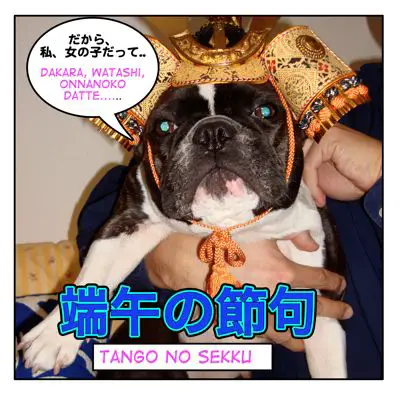
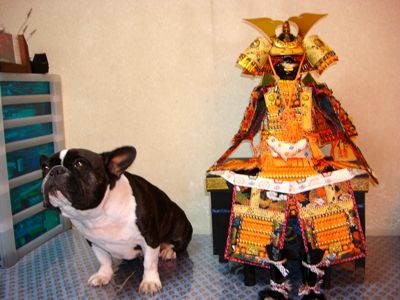
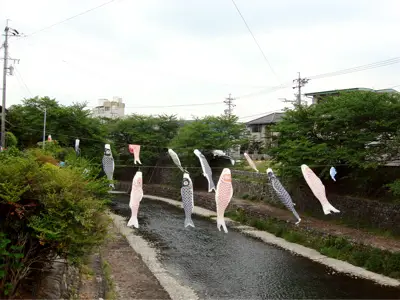
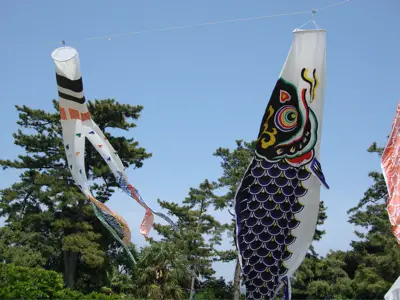

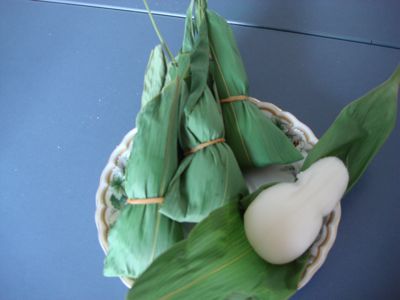
20 Comments
せんせい、キムチクッパはなんですか?
I know kimchi, but can’t find the meaning of kuppa anywhere? Is it rice in soup?
@Tiffany
クッパ? It’s rice in soup like Korean risotto!
Looks like this!
お誕生日おめでとうございます, Yukari. :)
@majoringram3636
わ〜!!ありがとうmajoringram!!!うれしいです!!(このサイトには初めてのコメントかな?) boucingheart!
これは今まで一番面白い授業です!!
日本の祝日などがいっぱい教えられて大変勉強になります、ありがとう、先生!^^
端午の節句のかげで、男の子たちは毎年鯉のぼりをかけられるのはうらやましい。。。なんときれいですが。。。
先生、八月のごろはぜひお盆休みのこと教えていただけませんか。
聞きたいことがひとつあります:「お帰りなさい」と「お帰りなさいませ」という表現の違うはなんですか?
@薫
こちらこそ、いつもありがとう!そうですね、また夏に夏のお祭りのレッスンを作りますね。
質問ですが、「お帰りなさい」と「お帰りなさいませ」の違いですが、「お帰りなさいませ」の方がずっと丁寧(ていねい)です。
(でも今は「お帰りなさいませ」はメイドカフェのメイドのあいさつで知られる様になりましたよね。)
メイドカフェですか?!ピンクなイメージが浮かびやすいね~~ほほほ
でも、「いらっしゃいませ」はいつも聞きますか?
@薫
ハハ ピンクというより”ヲタ”です!
はい、「いらっしゃいませ」は大体、どのお店に行っても言われます。
そうですね~~
私、日本ヲタLOL
Dear Maggie!
I also have a question: Are there any differences between 眠る and 寝る. Or are these words totally synonymous?
Many thanks in advance!
@Jetta
Hi, Jetta!
I will make a lesson on that subject for you sometime. I am in middle of making another request lessons so please wait!
Oh, thank you! I am looking forward to your next lesson. Meanwhile there is still more than enough for me to explore on your amazing site! Thanks a lot for your work!
Hi maggie sensei if im not mistaken is it something related with transitive/intransitive verb
I also confuse with that nemuru and neru… ?
@Angel & @Jetta
This is an old comment but I already made a lesson for Jetta years ago.
The difference between neru and nemuru.
Click this link →Click here
I have a question ……not sure if it’s ok to ask here but,
About “deru” “detekuru” “dereru
minna ga deru deshou??….does it mean that everyone is showing up or participating??
thank you~
@Manju
OK first of all
*出る= deru = to leave, to come out, to appear, to attend
Ex. 電車が出る= densha ga deru = a train leaves,
Ex. テレビに出る= terebi ni deru = to appear/show up on TV
Ex.この問題は試験に出る= kono mondai wa shiken ni deru = This question will be in the exam.
Now it is hard to translate just one sentence 皆が出るでしょう= Mina ga deru deshou because it needs an object.
But I can assume “Everybody will participate in something or attend something”
Ex.試合に出る=shiai ni deru = participate in game,
Ex.パーティーに出る= Paatii ni deru = to attend the party
Ex.授業に出る= jugyou ni deru = to attend the class
or something.
And
出てくる=detekuru = means to come out from somewhere, to appear from somewhere
and
出れる= to be able to leave
Hope I answered your question.
oshiete kurete arigatou gozaimasu!
Maggie Sensei daisuki desu ^o^
@Manju
どういたしまして!
Love you,too! !CHECKHEART!
「だから俺はお前のことが好きなんだよ!」きゃ~~!!!male speechすごーい!!(笑)
こっちは、5月6日から8月28まで夏休みだよ~!うらやましい?:)
仕事があるよ~!単科大学(college?いいかな??)に勤めている^^お金がほしいの!!$_$日本に行きたいけどplane ticket高いね!お金を貯めなきゃ>。<
がんばろう!!!
@Aki
ええ〜!!5月から夏休みが始まるの?うらやまし〜〜!!!
しっかりお金を貯めて日本に来てね!
「だから俺はお前のことが好きなんだよ!」ふふ..♡Akiの頭の中は亀君が… !CHECKHEART!